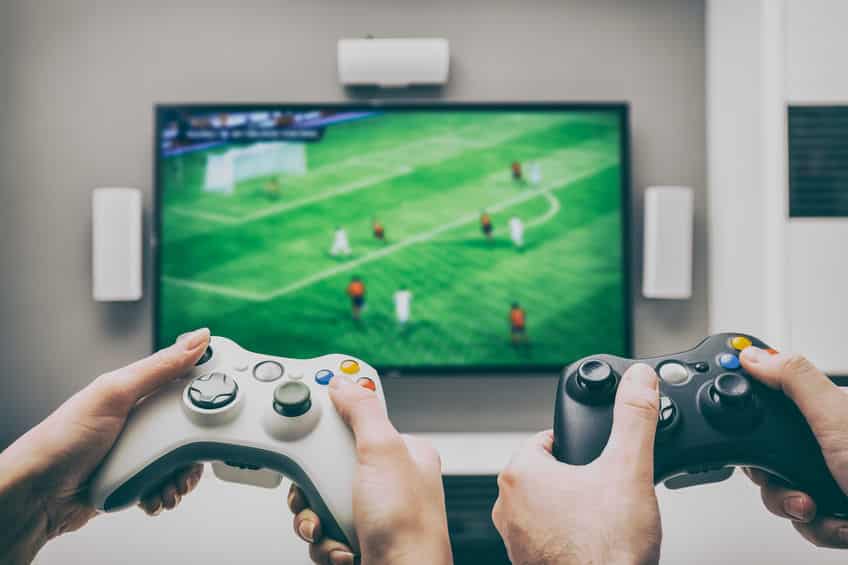By Jessica Scarpati –
When the video game Mortal Kombat was released in 1992, its pixelated depictions of violence—allowing players to dismember and decapitate an opponent with bloodthirsty flourish—were considered so outrageous that the game prompted a series of U.S. Senate hearings, subsequently leading to the creation of a regulatory board to assign age and content ratings for video games.
Video game violence has come a long way since then, with franchises like Call of Duty, Gears of War and Grand Theft Auto becoming more graphic, grotesque and high-definition with each new release. And three decades since the issue first became a flashpoint, many parents are still asking themselves the same question: Are video games rotting young people’s brains?
With so many households still cooped up due to the pandemic, and video gaming subsequently on the rise, parents concerned about screen time may be relieved to learn that several recent studies suggest video games aren’t the enemy.
“After a few decades of research in this area, the answer is not definitive,” wrote clinical psychologist Danielle Ramo in a recent blog post for Psychology Today. “There was a slew of studies in the early 2000s showing a link between violent video game play and aggressive behavior, and a subsequent onslaught of studies showing that the aggression was very slight and likely due to competition rather than the violent nature of the games themselves. For example, studies showed that people got just as aggressive when they lost at games like Mario Kart as when they lost a much more violent game such as Fortnite. It was likely the frustration of losing rather than the violence that caused people to act aggressively.”
In a recent study out of Singapore, scientists looked at how early exposure to aggressive video games affected the mental health of 3,000 adolescents over a two-year period. By the time the study ended, researchers found that playing aggressive video games did not raise their risk of mental health disorders such as anxiety, attention deficit hyperactivity disorder (ADHD) and depression.
A similar study in England, which looked at data from more than 11,000 adolescents, found that boys who, at age 11, played video games most days were less likely to experience symptoms of depression three years later, compared to boys who played video games less than once a month.
“While we cannot confirm whether playing video games actually improves mental health, it didn’t appear harmful in our study and may have some benefits. Particularly during the pandemic, video games have been an important social platform for young people,” said the U.K. study’s lead author, psychiatry researcher Aaron Kandola. “We need to reduce how much time children — and adults — spend sitting down, for their physical and mental health, but that doesn’t mean that screen use is inherently harmful.”
And as WellWell previously reported, gaming isn’t necessarily tied to poor physical health either, with a November 2020 study finding that esports players maintained a healthier weight than the general population.
In fact, video games might even be just what the doctor orders. Last June, the U.S. Food and Drug Administration approved the first video game as a medical treatment. The game, EndeavorRX, is used to treat children ages 8 to 12 with ADHD and can now be prescribed as a therapy.
Another study from last fall found that playing some video games makes you happier. Researchers at Oxford University teamed up with the makers of Animal Crossing: New Horizons and Plants vs. Zombies: Battle for Neighborville to analyze anonymous data about players’ habits and survey gamers separately about their well-being. They found that playing these games, including longer and more frequent sessions, was linked to better moods and improved well-being.
While families tend to focus on video games as a source of concern, experts point out that parents have been wringing their hands over entertainment’s impact on impressionable young minds for centuries.
“Upon the publication of Madame Bovary by Gustave Flaubert in 1857, it was believed that the book would lead to the collapse of social values. In the 1950s, comics were thought to be responsible for juvenile delinquency,” wrote U.K. psychology researchers Simon Goodson and Kirstie Turner in a guest editorial for Cyberpsychology, Behavior, and Social Networking, which published the Singapore study. “Over the last two decades, the press has presented a negative view of video games, again pointing the finger of blame for many atrocities, and the use of anecdotal evidence has been very prevalent.”
Parents, therefore, can cut their kids some slack, but experts caution that the Xbox or iPad shouldn’t be a de facto babysitter.
“Do parents still need to watch our children’s screen time? Yes, as too much video game play takes kids away from other valuable activities for their social, emotional and creative development, such as using their imagination and making things that have not been given to them by programmers,” Ramo said. “Do parents need to be freaking out that our kids trying to find the ‘imposter’ in a game will make them more likely to hit their friends when they are back together in person? Probably not.”













